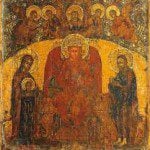Religious liberty is threatened. Many seeking to protect it are harming it.
President Donald Trump is making faith into pop-religion meriting a reality show. He is secularizing the sacred. Sadly, spiritual leaders are helping him to do it.
On Thursday, the president signed an executive order to weaken the Johnson Amendment. Passed in 1954, the amendment prohibited churches and other non-profits from engaging in partisan or political activity.
The president’s effort is a misguided attempt to fulfill a campaign pledge to “vigorously promote religious liberty.” The effort is more fluff than substance.
There is a toxic side effect. It creates a perception faith and religion is judgmental superstition driven to curtail civil liberties.
Fake Religious Liberty
Politicization of faith and its close association with an unpopular president makes it ripe for parody and ridicule on late night television. It provides raw material for Saturday Night Live and adult themed cartoon shows.
Even the litigious ACLU didn’t think the order had much gravitas to merit a legal challenge. It mocked the president’s order calling it a “photo-op” and “fake news.”
The civil liberties group may be right. It also underscores how faith and religion is marginalized by becoming a social, cultural, and political football.
Faith loses its mystery and mysticism to soundbites on the evening news as religious figures throw thunderbolts from the pulpit with the support of a cheer leading president. It becomes spiritually corrupt where an endorsement may get greater political access and favors.
It further encourages lucrative third-party donations from political action committees. Clergy risk becoming pawns for a buck with special invites to the White House.
Ironically, the president even cited Thomas Jefferson, a deist who rejected Christ’s divinity, at the recent National Prayer Breakfast to promote his Christian worldview.
Diminish Religious Freedom
There’s too little discussion what “religious freedom” means. The religious freedom of the Episcopal Church and the United Church of Christ, for example, to solemnize same-gender marriages is not part of the national discussion.
Their religious liberty has no impact on opponents of same-gender marriage. Yet same-gender marriage is cited as an example of religious liberty under threat.
The executive order causes friction and confusion. It also infers certain denominations have an unofficial, preferred status. Ironically, the president even cited Thomas Jefferson, a deist who rejected Christ’s divinity, at the National Prayer Breakfast to make his point and imply a particular Christian worldview.
Denigrate the Sacred
In April 2017, ninety-nine religious groups representing Jews, Sikhs, Hindus, Muslims, Christians, and Unitarians crafted a letter to Congressional leaders opposing the weakening of the Johnson Amendment.
According to the letter, “Current law serves as a valuable safeguard for the integrity of our charitable sector and campaign finance system.” The letter pointed out religious leaders can use their pulpits to discuss with congregations moral and political issues. Individually, they can endorse candidates.
“Current law,” the letter noted, “simply limits groups from being both a tax-exempt ministry and a partisan political entity.”
Political camps will further emerge in faith communities causing greater division. These same communities risk being torn apart while further becoming tools for partisan political operations.
Tragically, religious leaders will lose trust among those seeking spiritual solace who share different political views. Spiritually and emotionally vulnerable souls will think twice before unburdening themselves to a faith leader with opposing, possibly judgmental positions.
Create Dangerous Precedent to Disguise Bigotry
History is filled with examples of injustice in the name of God.
Will a conservative evangelical government employee use religious liberty to reject issuing a marriage license to a Hindu? Will a Muslim be turned away by a Jewish hotel owner based on differences in faith? Or will a government employee or business owner selectively use religion to pick and choose his or her target for discrimination?
In fairness to the president, his executive order doesn’t intend to go down this road. But the order does have unforeseen consequences. Social conservatives have already claimed the executive order was a good first start and want to build on it.
Conclusion
At least for now the president’s action may be legally neutral. At the same time it does influence a national culture where logic and common sense are marginalized. The order will have far reaching moral and ethical consequences polarizing Americans even more.
Paul P. Jesep is an attorney, corporate chaplain, and former US Government Relations Director for His Beatitude Metropolitan Myfody of the Ukrainian Autocephalous Orthodox Church of Kyiv and All Rus-Ukraine. He is author of “Lost Sense of Self & the Ethics Crisis” and “Crucifying Jesus and Secularizing America – the Nation of Faith without Wisdom.”











